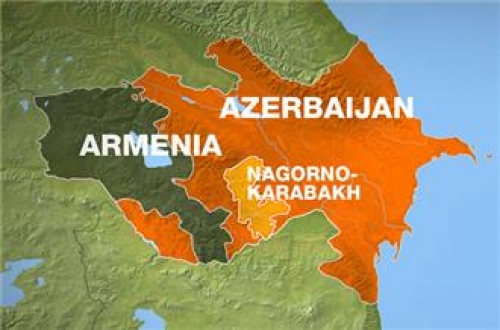Regional countries' role in Karabakh settlement in spotlight

By Sara Rajabova
The stalled negotiation process on the Armenia-Azerbaijan Nagorno-Karabakh conflict has prompted discussions about a mediating role of some regional states in the peaceful settlement of the long-standing dispute.
Recently, the role of Turkey as an intermediary was mulled by experts and diplomats, given that currently Ankara plays an important role in international relations.
Turkey is ready to expand its role in the mediating OSCE Minsk Group, and it is necessary to assign a major role to the country, Director of the Center for Eurasian Studies (AVİM), former Turkish ambassador to a number of countries, Alev Kilic, told Azerbaijan's Trend news agency.
Kilic said that though Turkey is one of the 11 members of the Minsk Group, it is not yet a co-chair.
"Turkey should therefore either become one of the co-chairing countries or find another way to increase its responsibility," Kilic said.
According to the diplomat, the current situation with the Nagorno-Karabakh conflict and the Armenian occupation of Azerbaijani territories are unacceptable.
"It has been 20 years and this conflict has not been settled and is now referred to as a 'frozen conflict'. It is clear that the OSCE Minsk Group has failed to resolve the issue...For Turkey, it is clear that the events cannot go on this way.
"We are thinking how to increase the effectiveness of the Minsk Group. This problem hinders the development of cooperation in the South Caucasus, the Black Sea basin and Central Asia region," the expert said.
Earlier, US Secretary of State John Kerry highlighted Turkey's role in the settlement of the conflict. He said Turkey is holding talks with the U.S. over the unresolved Nagorno-Karabakh conflict.
On the other hand, director of the Center for Political Innovations and Technologies, Mubariz Ahmadoglu, stressed Russia's role in the conflict settlement process.
He said Russia -- one of the co-chairs of the Minsk Group -- has created a turning point in the resolution of the conflict.
Ahmadoglu noted that in his speech at a recent joint press conference with his Azerbaijani counterpart, Russian Foreign Minister Sergei Lavrov said the status quo is definitely unacceptable for everyone.
"First of all, for Azerbaijan, Armenia and those who live in Nagorno-Karabakh, the status quo means not only the unresolved status of the issue of returning Azerbaijani territories, but also economic blockade of Armenia," the analyst concluded.
According to Ahmadoglu, Lavrov's statement has several important points.
"Russia openly put on the agenda the question of the return of the Azerbaijani territory, including Nagorno-Karabakh itself. Russia links the exit of Armenia from the blockade with Azerbaijan. In other words, restoration of Russia's ties with Armenia through the Azerbaijani territory, as it was during the Soviet times, has been put on the agenda," Ahmadoglu noted.
"Russia does not cite Nagorno-Karabakh as a subject in any shape or form and only refers to the population in Nagorno-Karabakh. This means that Russia does not recognize the independence of Nagorno-Karabakh and its joining Armenia. The likelihood of a change in Russia's current position over the Nagorno-Karabakh conflict is negiligible, you can say, it is impossible."
According to the analyst, Russia arrived at this stance after realizing the essence of the political games of the Armenians, which they had played until recently.
"The increase in the price of Russian gas sold to Armenia indicates clarification of Russia's relations towards this country. Azerbaijan has long been expecting a change in Russia's position. Except a few minor misunderstandings, the current situation is beneficial both for Russia and Azerbaijan, and if war breaks out in Nagorno-Karabakh, besides Azerbaijan, it could also affect neighboring Russia," Ahmadoglu said.
Armenia is "a myth country with no history and natural resources" established thanks to Russia, therefore, aggravation of the conflict is suitable for Armenia, the analyst said.
The Nagorno-Karabakh conflict emerged in 1988 when Armenia made territorial claims against Azerbaijan. Since a lengthy war in the early 1990s that displaced over one million Azerbaijanis, Armenian armed forces have occupied over 20 percent of Azerbaijan's internationally recognized territory, including Nagorno-Karabakh and seven adjacent regions. The UN Security Council has adopted four resolutions on Armenia's withdrawal from the Azerbaijani territory, but Armenia has not followed them to this day.
Russia, France and the U.S. - co-chairs of the OSCE Minsk Group - have long been working to broker a solution of the conflict, but their efforts have been largely fruitless so far.
Here we are to serve you with news right now. It does not cost much, but worth your attention.
Choose to support open, independent, quality journalism and subscribe on a monthly basis.
By subscribing to our online newspaper, you can have full digital access to all news, analysis, and much more.
You can also follow AzerNEWS on Twitter @AzerNewsAz or Facebook @AzerNewsNewspaper
Thank you!
